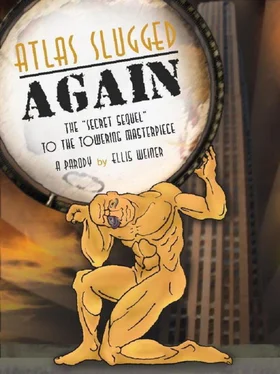Ellis Weiner - Atlas Slugged AGAIN - The Secret Sequel to the Towering Masterpiece
Здесь есть возможность читать онлайн «Ellis Weiner - Atlas Slugged AGAIN - The Secret Sequel to the Towering Masterpiece» весь текст электронной книги совершенно бесплатно (целиком полную версию без сокращений). В некоторых случаях можно слушать аудио, скачать через торрент в формате fb2 и присутствует краткое содержание. Год выпуска: 2015, Жанр: humor_satire, на английском языке. Описание произведения, (предисловие) а так же отзывы посетителей доступны на портале библиотеки ЛибКат.
- Название:Atlas Slugged AGAIN: The Secret Sequel to the Towering Masterpiece
- Автор:
- Жанр:
- Год:2015
- ISBN:нет данных
- Рейтинг книги:3 / 5. Голосов: 1
-
Избранное:Добавить в избранное
- Отзывы:
-
Ваша оценка:
- 60
- 1
- 2
- 3
- 4
- 5
Atlas Slugged AGAIN: The Secret Sequel to the Towering Masterpiece: краткое содержание, описание и аннотация
Предлагаем к чтению аннотацию, описание, краткое содержание или предисловие (зависит от того, что написал сам автор книги «Atlas Slugged AGAIN: The Secret Sequel to the Towering Masterpiece»). Если вы не нашли необходимую информацию о книге — напишите в комментариях, мы постараемся отыскать её.
Atlas Slugged AGAIN: The Secret Sequel to the Towering Masterpiece — читать онлайн бесплатно полную книгу (весь текст) целиком
Ниже представлен текст книги, разбитый по страницам. Система сохранения места последней прочитанной страницы, позволяет с удобством читать онлайн бесплатно книгу «Atlas Slugged AGAIN: The Secret Sequel to the Towering Masterpiece», без необходимости каждый раз заново искать на чём Вы остановились. Поставьте закладку, и сможете в любой момент перейти на страницу, на которой закончили чтение.
Интервал:
Закладка:
The porter, a dignified man named Ben Dover, wearing the official dark blue Tagbord Rail uniform, stopped on his way up the aisle and bent in professional deference. He had been serving the needs of passengers of the Executive Car since the earliest days, when Old Man Pop Gramps “Professor” Zayde Poppa “The Guv’nor” Tagbord had created the line, and had watched Dragnie grow from infancy. He was now ninety-seven years old, blind in one eye and functionally deaf, and yet he still worked, willingly and with the highest competence, for such was his dedication to his job and its ability to protect and safeguard his individuality from the effects of undeserved cost-of-living wage increases, unnecessary health care, and employer-funded pensions that enslaved workers on other, still-vaguely-unionized rail lines.
He now demonstrated his undiminished ability to transport, with one hand under a tray, a martini from the galley car without spilling a drop. “Is something wrong, Miss Dragnie?” he inquired in his wise and aged manner. “You look to be the subject of vexations.”
Dragnie forced a reassuring smile. “It’s nothing, Uncle Ben,” she murmured. “I’m just worried, I suppose—worried about the future of the entire world.”
The old man chuckled. “Well, I don’t know nothing about that,” he said. “All’s I know is, we’re out of chicken salad.”
Dragnie smiled. The courageous train rushed on to its once-dignified but now shamefaced destination.
The conference took place at the White Home, in a secret room unknown about by men not informed of its existence. As Dragnie entered she saw that John Glatt had already arrived, as had Sanfrancisco De Soto, Hunk Rawbone, and Regnad Daghammarskjold. The four men sat along one side of a table set with pitchers of water and glasses, both of the highest transparency, and legal pads and pens. Opposite them sat three representatives of the nominal government in whispered colloquy with its loathsome head, Mr. Jenkins. A sweat-soaked, fat man with repulsive male breasts, he gave a weak, contemptible smile as she moved toward her seat. “Ah. Miss Tagbord. Splendid. We’re all here.” He glanced at the hate-worthy bureaucrats flanking him and then gestured to Glatt and his companions. “So let’s get started.” The repellent chief executive composed the features of his ugly face into a stern and grim arrangement. “The word from the People’s States of the People is what we’d been fearing,” he said in a voice soaked in terror and self-pity. He shifted, his chair emitting squeals of protest as if in violent objection to being sat on by such an inferior individual. “They’re imposing a comprehensive embargo on all products made in the U.S. That’s not good. That’s not good at all!”
“But, why?” Dragnie said, her voice low.
“They say our products are too dangerous,” Mr. Jenkins replied.
“But, why?” Dragnie asked, her voice low.
“Our toys are covered with lead-based paint. Our cars explode when the odometer reaches three hundred. Our broccoli, kale, and Romaine lettuce harbor dangerous impurities such as salmonella, E.-coli , and other pathogens. Our kitchen appliances burst into flame the first time you plug them in. Our telephones generate X-rays that cause brain cancer.” Mr. Jenkins gulped convulsively and wiped sweat from his forehead with a disgusting handkerchief. “The common man doesn’t want brain cancer. The common man doesn’t want brain cancer at all, I tell you!”
“The market will decide that,” Hunk Rawbone murmured coolly. A thousand words screamed in his mind but he did not permit himself to give them voice. Instead, he mentally recommended that they shut up. “We manufacture our products as cheaply as possible in order to maximize profit. Perhaps that’s something they don’t understand any more in the People’s States of the People of France or England or Germany or Spain or Portugal or Greece or China or Australia.”
“Or Goa,” added Regnad Daghammarskjold, deliberately speaking with his voice.
“Look, Hunk,” Mr. Jenkins whined in the manner of a child seeking to escape blame for everything all the time. “I know that, and you know that. But the boys in the People’s States of the People don’t see it that way. They have objections to their kids being poisoned and their mix-masters blowing up. And now, with this embargo, we have no place to sell our exports.”
“We’ll sell them domestically,” Dragnie said, her voice low.
“To whom, Miss Tagbord?”
The question came from the man seated languidly to the right of Mr. Jenkins. He was Phillip Sissyberger, the Minister of Equality, a thin, meticulous aesthete in a custom-made, purple silk suit and a florid green bow tie. He sported a pencil-thin moustache and affected the airy, condescending manner of an individual for whom the supreme achievement of life was to be a big know-it-all. “The vast majority of our population can’t afford much more than food, clothing, and shelter. True, we boast an upper class the income of which may comfortably rival that of any aristocracy anywhere in the world—if there still are any aristocracies left, in our benighted age. But those people—one might call them ‘the achievers’ or ‘the successes’ or ‘the good people’—comprise less than one tenth of one percent of our populace, and in any case they scarcely have need of the cheap consumer goods our factories produce. They purchase their appliances and automobiles from the prestigious manufacturers in the People’s States of the People of England, Germany, Italy, and Sweden. No, my friends. We may all applaud the free-market revolution led by you four gentlemen and Miss Tagbord ten years ago. You may congratulate yourselves on the complete removal of all government regulation and oversight of industry. You may likewise take pride in the realization of your primary goal, which is and always has been the elimination and, indeed, de-legitimization of the very idea, of taxation, and for the complete subjugation of the public sphere to the interests of private enterprise. In this you have succeeded admirably. The popularity of Grand Canyon Fun Park, the lines at the District of ColumbiaLand ticket booths that surround this nation’s capital, the conversion of the Great Lakes into water hazards for the world’s largest miniature golf course—all of these attest to your achievement. But the equality characterizing our nation now consists in a near-universal state of lower-class subsistence. The American people can no more afford to buy their own products than they can afford to catch the flu or purchase loin lamb chops to feed a family of four.”
“The American people, sir, have one thing denied to the richest person in any other country on Earth.” Sanfrancisco De Soto leaned forward, his boyish charm apparent in his twinkly-eyed playfulness and faintly mocking smile. “It is something far more precious than German eggbeaters or English sports cars. Or, I might add, lamb chops. Perhaps you have heard of it. It is called ‘freedom.’ And it is with this freedom that each person is free—for that is why it is called ‘freedom’—to succeed or fail according to their own abilities. Each person is free to start his own steel mill, unburdened by government meddling. Each person is free to create a railroad and to do his damndest in competition against Miss Tagbord here. Each person is free to inherit a talc mine that has been in his family for generations, and to run it as he sees fit.”
“Yes, yes, freedom is wonderful,” Mr. Jenkins said hastily. “But we all have a country to run. I’m merely head of the Federal government. You five are calling the shots. What are we to do?”
Everyone, as everyone always did, turned toward John Glatt.
Читать дальшеИнтервал:
Закладка:
Похожие книги на «Atlas Slugged AGAIN: The Secret Sequel to the Towering Masterpiece»
Представляем Вашему вниманию похожие книги на «Atlas Slugged AGAIN: The Secret Sequel to the Towering Masterpiece» списком для выбора. Мы отобрали схожую по названию и смыслу литературу в надежде предоставить читателям больше вариантов отыскать новые, интересные, ещё непрочитанные произведения.
Обсуждение, отзывы о книге «Atlas Slugged AGAIN: The Secret Sequel to the Towering Masterpiece» и просто собственные мнения читателей. Оставьте ваши комментарии, напишите, что Вы думаете о произведении, его смысле или главных героях. Укажите что конкретно понравилось, а что нет, и почему Вы так считаете.












